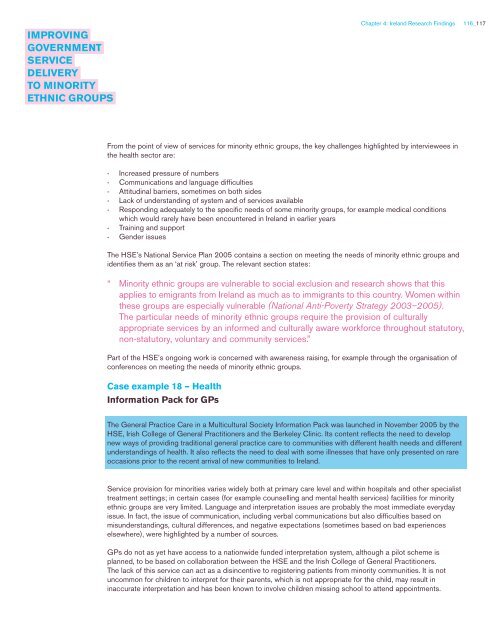improving government service delivery to minority ethnic ... - NCCRI
improving government service delivery to minority ethnic ... - NCCRI
improving government service delivery to minority ethnic ... - NCCRI
You also want an ePaper? Increase the reach of your titles
YUMPU automatically turns print PDFs into web optimized ePapers that Google loves.
<strong>improving</strong><br />
<strong>government</strong><br />
<strong>service</strong><br />
<strong>delivery</strong><br />
<strong>to</strong> <strong>minority</strong><br />
<strong>ethnic</strong> groups<br />
Chapter 4: Ireland Research Findings 116_117<br />
From the point of view of <strong>service</strong>s for <strong>minority</strong> <strong>ethnic</strong> groups, the key challenges highlighted by interviewees in<br />
the health sec<strong>to</strong>r are:<br />
-<br />
-<br />
-<br />
-<br />
-<br />
-<br />
-<br />
Increased pressure of numbers<br />
Communications and language difficulties<br />
Attitudinal barriers, sometimes on both sides<br />
Lack of understanding of system and of <strong>service</strong>s available<br />
Responding adequately <strong>to</strong> the specific needs of some <strong>minority</strong> groups, for example medical conditions<br />
which would rarely have been encountered in Ireland in earlier years<br />
Training and support<br />
Gender issues<br />
The HSE’s National Service Plan 2005 contains a section on meeting the needs of <strong>minority</strong> <strong>ethnic</strong> groups and<br />
identifies them as an ‘at risk’ group. The relevant section states:<br />
“ Minority <strong>ethnic</strong> groups are vulnerable <strong>to</strong> social exclusion and research shows that this<br />
applies <strong>to</strong> emigrants from Ireland as much as <strong>to</strong> immigrants <strong>to</strong> this country. Women within<br />
these groups are especially vulnerable (National Anti-Poverty Strategy 2003–2005).<br />
The particular needs of <strong>minority</strong> <strong>ethnic</strong> groups require the provision of culturally<br />
appropriate <strong>service</strong>s by an informed and culturally aware workforce throughout statu<strong>to</strong>ry,<br />
non-statu<strong>to</strong>ry, voluntary and community <strong>service</strong>s.”<br />
Part of the HSE’s ongoing work is concerned with awareness raising, for example through the organisation of<br />
conferences on meeting the needs of <strong>minority</strong> <strong>ethnic</strong> groups.<br />
Case example 18 – Health<br />
Information Pack for GPs<br />
The General Practice Care in a Multicultural Society Information Pack was launched in November 2005 by the<br />
HSE, Irish College of General Practitioners and the Berkeley Clinic. Its content reflects the need <strong>to</strong> develop<br />
new ways of providing traditional general practice care <strong>to</strong> communities with different health needs and different<br />
understandings of health. It also reflects the need <strong>to</strong> deal with some illnesses that have only presented on rare<br />
occasions prior <strong>to</strong> the recent arrival of new communities <strong>to</strong> Ireland.<br />
Service provision for minorities varies widely both at primary care level and within hospitals and other specialist<br />
treatment settings; in certain cases (for example counselling and mental health <strong>service</strong>s) facilities for <strong>minority</strong><br />
<strong>ethnic</strong> groups are very limited. Language and interpretation issues are probably the most immediate everyday<br />
issue. In fact, the issue of communication, including verbal communications but also difficulties based on<br />
misunderstandings, cultural differences, and negative expectations (sometimes based on bad experiences<br />
elsewhere), were highlighted by a number of sources.<br />
GPs do not as yet have access <strong>to</strong> a nationwide funded interpretation system, although a pilot scheme is<br />
planned, <strong>to</strong> be based on collaboration between the HSE and the Irish College of General Practitioners.<br />
The lack of this <strong>service</strong> can act as a disincentive <strong>to</strong> registering patients from <strong>minority</strong> communities. It is not<br />
uncommon for children <strong>to</strong> interpret for their parents, which is not appropriate for the child, may result in<br />
inaccurate interpretation and has been known <strong>to</strong> involve children missing school <strong>to</strong> attend appointments.
















